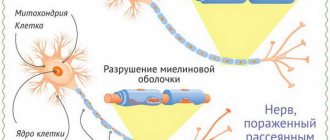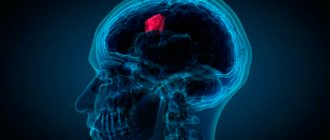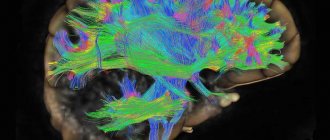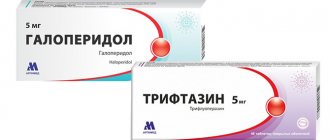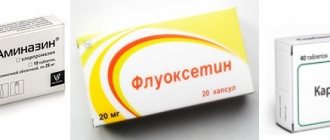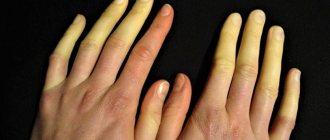0
The harm and negative aspects of alcoholism are known to everyone today. Many, unfortunately, have a clear example among their family and friends. However, unlimited consumption of alcohol not only removes the alcoholic from a normal social environment, harms the functioning of all systems and internal organs, but is also fraught with serious and irreversible problems with the psyche of such a person. Some psychoses and syndromes may go away over time after stopping binge drinking, but there are mental illnesses whose development cannot be stopped even without drinking high-intensity drinks. One of them is Korsakoff's syndrome.
Korsakoff syndrome treatment
The leading reason leading to the onset of Korsakoff's syndrome is a pronounced deficiency in the body of thiamine - vitamin B1. The main culprit of this deficiency is chronic alcoholism.
Long-term alcoholism and regular intoxication of the body with ethanol breakdown products lead to impaired absorption of thiamine. Since thiamine is a water-soluble compound, it is not stored in the body. The presence of ethanol in the blood inhibits the mechanisms of thiamine phosphorylation, which is necessary for the production of active coenzyme forms of vitamin B1.
A person who abuses alcohol develops acute or subacute damage to the midbrain and hypothalamus, called Gaye-Wernicke syndrome. In the absence of timely and adequate treatment, Wernicke encephalopathy becomes chronic, transforming into Korsakoff syndrome. At the same time, developing memory impairments and other defects are always severe, so the sick subject may require lifelong care.
The prevalence of Korsakov's syndrome has not been sufficiently studied, however, in recent years there has been a trend towards a decrease in the number of patients whose disorder is associated with alcoholism. This can be explained by the fact that when performing detoxification measures for acute alcohol disorders, thiamine is always present in the treatment regimen.
Korsakoff's syndrome is also present in a wide range of neurological pathologies, visceral diseases and other painful conditions. Cause of amnestic syndrome:
- benign and malignant neoplasms in brain structures;
- damage to brain tissue as a result of acute circulatory disorders and the resulting cerebral infarction;
- subarachnoid hemorrhage;
- contact damage to the soft tissues of the head, cranial structures, brain matter as a result of injuries;
- herpetic encephalitis is an acute infectious disease provoked by activation of the herpes simplex virus, which manifests itself in general cerebral and focal symptoms of central nervous system damage;
- limbic encephalitis is a neurological pathology in which the autoimmune inflammatory process is concentrated in the limbic structures.
Amnestic syndrome can develop due to chronic lack of nutrition due to prolonged fasting or prolonged adherence to strict diets. The onset of pathology can be provoked by biliopancreatic shunting - a malabsorptive operation, as a result of which the absorption of nutrients in the gastrointestinal tract is reduced.
The main manifestation of Korsakov's syndrome is fixation amnesia. Due to existing defects in the mechanism for transferring information from short-term memory to long-term “storage,” memory traces are not strengthened.
If the cause of the anomaly is chronic alcoholism, then the first precursors of Korsakoff syndrome may be noticeable a year before the onset of the disease. A person feels numbness, tingling, “pins and needles”, aching pain in the lower extremities. During a night's rest, cramps in the calf muscles may occur.
- Constant headache. Episodes of dizziness are frequent. The mental activity of the subject also undergoes changes. The patient's intellectual level deteriorates and his range of interests decreases. Irrational anxiety, unaccountable fear, and expectations of imminent misfortune arise. Severe sleep problems arise, and the patient is often bothered by nightmares. The onset of Korsakov's syndrome due to alcoholism follows the same scenario as delirium delirium.
- The patient's consciousness is impaired: he becomes disoriented in time and space. Visual and verbal hallucinations with frightening content often occur. As consciousness becomes clearer, fixation amnesia—the loss of memories for current facts—begins to take first place. Memories of distant events: episodes of youth or childhood are preserved in full. The patient is able to reproduce everything that happened before the illness. The subject is partially able to reproduce existing professional skills.
- The person may lose the ability to learn. The patient has a very hard time accepting any changes: he cannot tolerate rearranging the furniture in his home, and cannot tolerate the appearance of new faces in his environment.
- The clinical picture of Korsakov's syndrome also includes amnestic disorientation. The patient becomes completely disoriented in space and time. He does not recognize the people around him, does not understand what place he is in, does not know what day it is today.
- Paramnesia. The patient experiences confabulations—false memories of a fantastic nature. Moreover, the subject is confident in the veracity of his memories, and does not believe in the arguments proving their falsity. There are no contradictions in the individual’s narrative about his past: all stories are supplemented with numerous details.
- Cryptomnesia is a phenomenon in which a person believes that what he read about in a book or saw in a film actually happened to him. He is unable to separate his own memories from other people's ideas.
- Pseudo-reminiscences are a time displacement of a person’s memories. This is the situation when the subject passes off episodes from the past as current phenomena.
Korsakoff syndrome also manifests itself with other psychotic signs. The patient may have severe anxiety. There are frequent mood swings. The person may be in a state of euphoria and be very fussy. Or, on the contrary, he loses initiative and becomes inactive.
Treatment of Korsakoff's syndrome, as well as Korsakoff's psychosis, in the acute phase of the disease is carried out in the inpatient department of a psychiatric hospital or drug addiction clinic. This is necessary, first of all, in order to ensure that the patient completely abstains from drinking alcohol, which is often impossible to do outside a hospital.
In addition, the patient’s psychomotor agitation, severe memory impairment, and inability to adequately orientate deprive the person of the ability to self-care. To maintain the normal functioning of the patient’s body, timely nutrition, hygiene procedures, and medical procedures, the assistance of qualified medical personnel is required.
We suggest you read: Nausea after alcohol. Vomiting after alcohol
If the cause of Korsakov's syndrome is chronic alcoholism, if the patient has symptoms of delirium tremens, the same treatment strategy is used as for delirium tremens. Regardless of the provocateur of Korsakoff's syndrome, the most important role in treatment is assigned to the use of high doses of thiamine and pyridoxine.
The introduction of vitamins B1 and B6 can eliminate the deficiency of these substances in the body and eliminate the symptoms of polyneuritic syndrome. The use of B vitamins helps relieve pain along the nerve trunks in the distal parts of the arms and legs, eliminate paresthesia and anesthesia.
Treatment of amnestic syndrome caused by alcoholism involves detoxification procedures at the beginning of therapy. As a rule, intravenous administration of a solution of glucose and magnesium sulfate is carried out. To restore mnestic function, improve attention and learning ability, it is advisable to conduct a course of therapy with nootropic drugs.
The success of treatment for Korsakoff's syndrome depends on numerous factors: the patient's age, general health, the presence of chronic somatic diseases, the severity of cognitive disorders, and length of alcoholism. In most patients, memory defects lose their expressiveness during therapy.
Korsakoff's syndrome is a combination of disorders that are characterized by impaired memory, orientation in time and space, and the presence of false memories of recent events. The disease was named after the psychiatrist S. Korsakov, who was the first to describe the clinical picture of psychological and psychiatric disorders in patients in the 19th century.
Korsakov's syndrome manifests itself as memory impairment, patients experience spatial and temporal disorientation, many cease to recognize family and friends. The affective form is accompanied by:
- irritability;
- dysphoria;
- unstable mood;
- increased anxiety;
- panic attacks.
The patient's physical condition is exhausted, rapid fatigue is observed, and there is no way to restore lost strength. The patient cannot adequately assess his behavior and general condition. As a rule, he cannot recognize the problem and denies the presence of the disorder. A person in this condition requires qualified assistance from a specialist and the support of loved ones.
Alcoholic Korsakoff syndrome is accompanied by a special symptom called confabulation. It lies in the fact that the patient replaces in his memory the events that happened to him in life with false ones. In some cases, the memories are close to real cases, but sometimes they are completely fantastic.
With the dynamic development of the disease, the symptoms of Korsakov's syndrome can “layer” and become more severe over time. Doctors know of cases where some signs disappeared, but the following functions may be restored:
- motivational;
- cognitive;
- motor;
- affective.
The main cause of Korsakoff syndrome is a lack of vitamin B1 in the body. This may result from:
- head injuries;
- brain hypoxia;
- regular violation of diet;
- alcohol abuse;
- temple surgery for the treatment of epilepsy.
Precursors of disease development
A couple of years before the development of an acute form of mental disorder, signs of pathological processes in the body may already appear. If you pay attention to them in time, an acute attack can be prevented by providing the patient with timely medical care.
Frequently recurring depressive states and feelings of anxiety should not be left untreated. Headaches, night cramps of the calf muscles, dizziness, aches (or nagging pain) in the legs can eventually develop into Korsakoff psychosis. Characteristic harbingers are also: darkening in the eyes (or, on the contrary, “sparks”), unevenness and unsteadiness of gait, especially after drinking alcohol.
Additional factors that provoke the development of the disease are usually severe somatic diseases or injuries that deplete the body’s potential.
Clinical picture
From the manifestations of K. s. Memory disorders for current events are especially pronounced: patients almost instantly forget the content of what they just said, after a few minutes they do not remember who approached them, which is why they can say hello to the same people many times, ask the same questions questions;
they cannot say what they just did or what they ate; They read the same page in a book for weeks, immediately forgetting what they read. Verbal memory is most severely impaired, figurative memory is to a lesser extent, and the so-called memory suffers even less. emotional memory, in connection with which, completely not remembering the content of an unpleasant event, the patient may get into a bad mood in the environment where it happened, or at the sight of a person related to him.
Despite a pronounced memory disorder for current events, memory for past life events, often distant, remains with K. s. relatively intact, and some memories of ancient events are particularly vivid. However, the events immediately preceding the disease, often spanning weeks, months and even years, can completely disappear from the patient’s memory, which allows us to talk about the presence of c. retrograde amnesia (see) of varying duration.
Characteristic for K. s. Disorders of orientation in time, place and environment are expressed to varying degrees. Time orientation is most severely impaired, and patients often cannot name not only the date, day of the week, month and year, but also the time of year. Orientation in a place is also inaccurate in most cases.
False memories in K. s. There are two types. More typical are the replacement of memory gaps for current events with memories of real events that occurred in the past. Thus, patients who have been in the hospital for a long time say that they recently “came from work”, “were visiting relatives”, etc.
We invite you to familiarize yourself with: Effective methods of coding for alcoholism by intravenous injection, coding into a vein
This type of false memory is called pseudoreminiscence. Less often, when asked about their current life, patients report fictitious stories, often of fantastic content (“traveled to the countries of Africa and Asia, met the Abyssinian Negus,” “flew on a spaceship,” etc.). Such memory deceptions are called confabulations (see Confabulosis). Patients with K. s. suggestible. Asking questions can trigger one type of false memory or another.
An influx of abundant confabulations with deep disorientation and incoherent thinking in the absence of clouding of consciousness is called confabulatory confusion. The latter is mainly observed with K. s. in patients with a variant of senile dementia, designated as hron, Wernicke's presbyophrenia (see Senile dementia).
In some patients with K. s. Sometimes phenomena of false recognition are observed when they mistake others for people they have met before.
Patients with K. s. in most cases, one or another degree of intellectual deficiency is characteristic, which is expressed in a weakening of the productivity of thinking, stereotypicality and monotony of judgments, their pronounced dependence on external impressions, the inability to notice contradictions in one’s own statements, and to detect the incompatibility of false memories with reality. At the same time, some patients are distinguished by a certain intelligence and, within a specific situation, sometimes skillfully mask memory defects.
In most patients with K. s. there is a more or less pronounced decrease in the level of impulses and volitional activity, and therefore, left to their own devices, they can remain inactive for hours. More often these are elderly people. They have a predominant apathetic or apathetic-euphoric mood background. Young people are usually more active.
As a rule, patients' consciousness is not clouded. At the same time, a combination of K. with. with states of clouded consciousness, more often with symptoms of delirium (see Delirious syndrome), accompanied by motor restlessness and occurring mainly at night.
K. s. may have a number of age-related characteristics. Thus, in children, false memories are usually absent or weakly expressed. In old age, orientation disorders are especially intense (amnestic disorientation), and orientation in the immediate environment is often disturbed, false memories manifest themselves in the form of replacement of memory gaps with events of the distant past (ecmnestic confabulations), and false recognitions are frequent.
As a rule, K. s. is a relatively persistent, chronic condition. However, cases of transient C. are possible, for example, with traumatic brain injuries, delirium tremens, carbon monoxide poisoning, and postoperative psychoses. Transient K. s. is one of the transitional Vick syndromes.
Current of K. s. depends mainly on the nature of the underlying disease. So, alcoholic K. s. occurs acutely, immediately after the patient emerges from a state of darkened consciousness, and then a long-term (from 2 to 15 years) stationary course is possible, followed by a slow reverse development, which ends in an outcome in a personality defect in the form of intellectual failure, memory weakness, decreased activity and apathetic or apathetic-euphoric mood.
K. s. with severe brain hypoxia (carbon monoxide poisoning, self-hanging) develops acutely, following a period of darkened consciousness; the stationary period is relatively shorter (from several weeks to 2-3 years), followed by a regressive course. Sometimes the illness ends in complete recovery. However, a more typical outcome is a personality defect with intellectual-mnestic deficiency.
K. s. with traumatic brain injuries, it also begins acutely, after a period of darkened consciousness. Its further course is regressive, although the outcome of complete recovery is rarely observed. The development of a persistent mental defect is more often noted.
For vascular diseases of the brain (cerebral atherosclerosis, hypertension) K. s. develops gradually, has a more or less long stationary period, which is replaced by a progressive course, characterized by progressive amnesia and deepening intellectual disability. K. s.
T. o., K. s. can have a stationary, regressive and progressive course.
We suggest you read: Treatment of hangover syndrome at home
Medical diagnostics
For effective treatment, it is important to distinguish Korsakoff psychosis from other forms of mental disorders with similar symptoms.
Among mental disorders caused by alcohol consumption, psychosis (when the patient's brain cells die) must be differentiated from delirium tremens and alcoholic dementia.
Since Korsakov’s psychosis can be provoked not only by alcohol, the prescribed treatment will differ in cases where the cause of the disease lies in other causes of damage to the human nervous system.
Medical diagnostics must include:
- General examination of the patient.
- Blood tests (in particular, the level of thiamine in the body).
- Monitoring liver function (enzyme analysis).
- Checking for possible motor coordination disorders.
- Research into the functioning of the brain (limbic system).
- Testing for possible memory impairments, level of memorization and adequate processing of information.
Only a complete diagnosis allows you to take into account the entire clinical picture and prescribe the correct treatment. Remember that often the patient does not realize the abnormality of his condition and cannot seek medical help himself.
Etiology and pathogenesis
In the etiology of K. s. Various factors that cause organic brain damage may play a role: severe intoxication, primarily chronic, alcohol intoxication, chronic, vitamin B1 deficiency in the diet, infections, traumatic brain injuries, brain tumors, hypoxia of various origins, cerebrovascular accidents, senile processes .
Pathogenesis K. s. not entirely clear. Pathopsychol. the basis of memory disorders for current events in K. s. consider violations of their retention (retention) and especially reproduction (reproduction), while direct memorization suffers little. The argument in favor of this is the ability of some patients, upon recovery from a painful state, to recall individual events that took place during the period of presence of K. s.
Significant role in the pathogenesis of K. s. is attributed to bilateral damage to some structures of the limbic system of the brain, primarily the papillary bodies, fornix, and partly the hippocampus. It is believed that damage to these structures leads to disruption of the nonspecific mechanisms associated with them that contribute to the retention and reproduction of memory traces.
Pathogenesis K. s. different for different diseases. One of the leading links in the pathogenesis of K. s. alcoholic etiology (Korsakov's psychosis), as well as K. s. in some types of nutritional deficiency (beriberi disease, secondary vitamin deficiency in diabetes, uncontrollable vomiting of pregnant women) there is a deficiency in the body of vitamin B1, which, due to secondary, insufficiently understood metabolic disorders, leads to various morphological changes (necrosis, demyelination, gliosis, proliferation of capillaries, microhemorrhages, etc.
Pathogenetic mechanisms of K. s. other etiologies are determined by the pathogenesis of the underlying disease, but there are probably common mechanisms, as indicated by the frequent detection of morphol, changes in the papillary bodies and other deep brain formations associated with them.
Flow
Korsakoff's syndrome usually begins suddenly. The disease is chronic, progressing over time.
Verbal memory and memory for current events suffer the most. Figurative and emotional types of memory are to a lesser extent impaired. The ability of patients to navigate their environment and time varies to varying degrees.
Korsakoff syndrome in alcoholism occurs in old age and is characterized by increasing dementia. The process intensifies over time, lasts up to 15 years, and leads to intellectual disability.
Korsakoff syndrome treatment
Treatment depends on the underlying disease and is often symptomatic. Drugs that stimulate metabolic processes in the brain (aminolone, glutamic acid, vitamins) are recommended. In cases of K. developed as a result of vitamin B1 deficiency, intramuscular injections of vitamin B1 are used and a diet rich in proteins and low in carbohydrates is prescribed (in order to reduce the need for vitamin B1).
Korsakov's amnestic syndrome, which develops after vitamin B1 deficiency, is treated with intramuscular injections of vitamin B1. A diet rich in proteins and low in carbohydrates is recommended. The prognosis is often favorable, however, due to the occurrence of persistent disturbances in mental activity, intellectual-mnestic disorders arise that reduce the possibility of social readaptation.
With post-hypoxic, as well as with post-traumatic Korsakoff syndrome, recovery is possible without manifestations of intellectual-mnestic disorders.
Symptoms
Many experts recommend separating Korsakoff's syndrome from psychosis. In the first case, the manifestations are amnestic in nature, in the second - the development of additional symptoms in the form of motivational, physical and affective disorders, as well as polyneuritis. Psychosis mainly occurs against the background of the acute stage of alcohol dependence.
Symptoms of alcohol syndrome appear gradually: body aches and nagging pain in the legs. During a hangover, the gait becomes unsteady, sparks and darkening appear in the eyes. Cramps are possible at night. Pain in the head and dizziness appear, anxiety arises, and the person’s range of interests decreases.
Symptoms are more pronounced in liver diseases, colitis, somatic diseases and injuries. Initially, the process takes the form of alcoholic delirium, characterized by impaired consciousness, visual and auditory hallucinations, and loss of spatial orientation. After the manifestation of consciousness, retrograde amnesia occurs.
The memorization process is extremely difficult. Among the striking signs are:
Therapy for Korsakoff psychosis
Depending on the symptoms, treatment combines methods of psychiatry, narcology and neuropathology. The acute form of Korsakov's psychosis requires mandatory hospitalization.
The full range of medical measures includes:
- the patient’s complete refusal to drink alcohol;
- detoxification: removal, removal of toxic substances from the body in combination with the introduction of doses of thiamine;
- antipsychotics for the relief of acute psychotic disorder;
- antidepressants to relieve anxiety;
- nootropic drugs to stimulate brain function;
- a special diet with a high protein content;
- psychocorrection sessions, the purpose of which is to restore the patient’s full social life and prevent possible returns to a pathological lifestyle;
- a course of vitamins (especially vitamin B);
- physical therapy, massage to eliminate muscle atrophy and paralysis.
Symptoms
Korsakov's psychosis, which developed against the background of chronic alcoholism, has characteristic symptoms:
- weakness, headache;
- loss of orientation in time and space;
- fixation amnesia, in which the patient cannot reproduce the information just received;
- confabulation - replacing memories with information heard from third parties or read in books, that is, that has never happened to a person;
- anterograde amnesia – loss of memory for events that occurred after the development of the disease;
- decreased critical thinking towards yourself and the world around you;
- intellectual disability;
- gross personality violations;
- increased aggressiveness;
- decreased learning ability, loss of professional skills;
- depressive states.
Causes
Although alcoholism is far from the only reason why Korsakoff syndrome (psychosis) occurs, it is alcoholics who suffer from it most often. The main reasons for the development of pathology can be identified:
- digestive and metabolic disorders;
- regular intoxication of the body;
- liver dysfunction.
All this leads to the fact that a constant severe deficiency of B vitamins (especially thiamine) thoroughly destroys the patient’s body. The condition worsens if the person has suffered a head injury or surgery on the temporal lobes, or suffered from hepatitis or infections.
Cure possibilities
With systematic drunkenness, Korsakoff psychosis can develop quite quickly, and sometimes take decades to recover. Returns to alcohol abuse quickly nullify the efforts of doctors to rehabilitate a sick person. In such cases, the scale of brain damage often leads to dementia, and in acute forms of the disease, death is possible.
Younger patients who are ready to completely give up drinking alcohol have a favorable prognosis for full recovery after a mental disorder. If the case of the disease is not severe, then within a year there is a possibility of complete restoration of memory and nervous activity of the body. Of course, this requires complete treatment and a persistent refusal to drink alcohol.
Korsakoff psychosis is accompanied by a lack of vitamin B1 (thiamine) in the human body
In any case, mental disorder is easier to prevent than to cure. A healthy lifestyle without bad habits, a diet rich in vitamins and peace of mind are the best prevention of many diseases, including mental disorders.
Alcohol abuse inevitably destroys the balance of vital substances in the human body. For example, a deficiency of thiamine (B1) and nicotinic acid occurs, which simultaneously affects the psyche and nervous system. The result is a mental disorder, which in psychiatry is called Korsakoff psychosis (syndrome).



